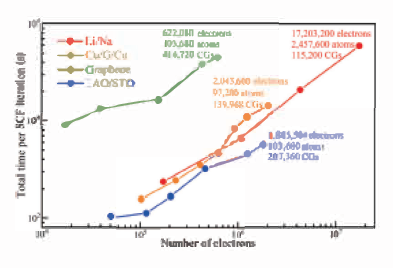Wei Hu1*, Xinming Qin, and Jinlong Yang
1University of Science and Technology of China, Hefei, Anhui 230026, China
EXTENDED ABSTRACT: High-performance computing is a powerful tool for accelerating first-principles density function theory (DPT) calculations on modern supercomputers. In this report, we describe how the discontinuous Galerkin DPT (DGDPT) software can realize exascale high-performance computing on new Sunway supercomputer (Ocean Light). DGDPT uses the adaptive local basis functions (ALB) dynamically generated in the self-consistent field iteration process to solve the global Kohn-Sham equations with high accuracy comparable to standard plane waves. Moreover, DGDPT adopts a twolevel parallelization strategy to deal with different types of data distribution, task scheduling and data communication. By further combining the characteristics of the Sunway master-slave multi-thread heterogeneous parallelism, we have realized the exascale high-performance parallel computing of DGDFT the exascale high-performance parallel computing of DGDFT on the new Sunway supercomputer. Due to the high scalabilityof DGDFT, a parallel efficiency of 60% is still maintained when using 39,087,360 cores (601,344 MPI processes) of the new Sunway supercomputer. As a result, DGDFT can be usedto study the electronic structures of complex metallic systems containing millions of atoms (2.5 million atoms in Li-Na alloy)Keywords:First-principles calculations; Density functionaltheory; High performance computing; Sunway supercomputer
REFERENCES
[1] Wei Hu*, Lin Lin*, and Chao Yang*, J. Chem. Phys. 143, 124110 (2015).
[2] Wei Hu, Ximning Qin, Weile Jia, Hong An*, Jinlong Yang*, et al, Sci. Bull. 66, 111 (2021).
[3] Wei Hu, Hong An*, Weile Jia*, Jinlong Yang*, et al, SC22, ACM Gordon Bell Prize Finalist (2022).
[ 4] Ximning Qin, Wei Hu*, Jinlong Yang, et al, CCF Transactions on High Performance Computing (2022).


Wei Hu obtained the B.S. degree (2007) and the Ph.D. degree (2013) supervised by Prof. Jinlong Yang, from the University of Science and Technology of China (USTC), postdoc in the Lawrence Berkeley National Laboratory (LBNL) (2014-2018) with Prof. Chao Yang (LBNL) and Prof. Lin Lin (UC Berkeley). Wei Hu became a professor (2018-present) at the Hefei National Research Center for Physical Sciences at the Microscale of USTC. He was a recipient of Chinese Academy of Sciences Pioneer Hundred Talents Program Scholarship (2018), Chinese Chemical Society Tang Au-Chin Young Investigator Award in Theoretical Chemistry (2020). He focuses on the development of low-scaling algorithms and high-performance parallel computing software packages for large-scale DFT on modem supercomputers.